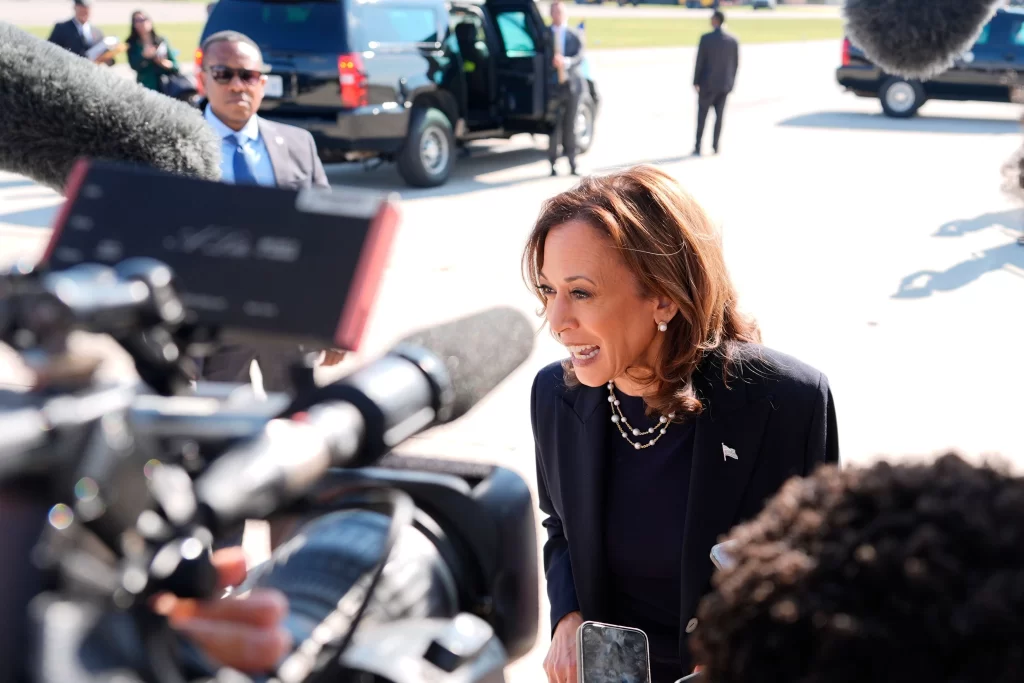Vice President Kamala Harris sought to distance herself from President Joe Biden’s recent comments that seemingly labeled Donald Trump’s supporters as “garbage.” This incident has ignited a political uproar just a week before Election Day, with many Democrats expressing private frustration over the president’s choice of words.
In a press conference at Joint Base Andrews, Harris emphasized her disagreement with any criticism based on individuals’ voting choices. Responding to whether she had discussed the comments with Biden, she noted that they had spoken the night before, but the remarks did not come up in their conversation.
“First of all, he clarified his comments, but let me be clear: I strongly disagree with any criticism of people based on who they vote for,” Harris stated. “You heard my speech last night, and throughout my career, I believe my work is about representing all the people, whether they support me or not.”
Harris reiterated her commitment to inclusivity, stating, “When elected president of the United States, I will represent all Americans, including those who don’t vote for me, and address their needs and desires.” This assertion aims to reinforce her stance of unity amid the political turmoil sparked by Biden’s remarks.
The controversy arose when Biden attempted to criticize Trump’s rally at Madison Square Garden, where a comedian referred to Puerto Rico as a “floating island of garbage.” During a Voto Latino event, Biden remarked, “The only garbage I see floating out there is his supporters,” adding that Trump’s rhetoric toward Latinos was “unconscionable and un-American.”
Later, Biden attempted to clarify his comments on social media, stating, “Earlier today I referred to the hateful rhetoric about Puerto Rico spewed by Trump’s supporter at his Madison Square Garden rally as garbage—which is the only word I can think of to describe it.” A White House spokesperson further clarified that Biden meant to refer to a single supporter rather than Trump’s supporters as a whole.
Despite the clarifications, the fallout from Biden’s comments has left many Democrats feeling exasperated. Senior campaign officials have reportedly received messages from concerned supporters suggesting that Biden should minimize his public appearances leading up to the election. One former administration official expressed frustration, saying, “Nobody wants him out there.”
Biden’s remarks have become a distraction for the campaign, providing ammunition for Trump and his allies to accuse Harris and her team of looking down on his supporters. In response, Democrats are emphasizing that Biden is not the presidential nominee and that Harris respects all voters, regardless of their political affiliation. They also criticize the perceived double standard when comparing Biden’s remarks to Trump’s history of divisive language.
One campaign adviser dismissed the significance of Biden’s comments, asserting, “We won’t lose a single voter because of it.” However, there has been growing concern among Harris’s team about Biden’s gaffes, particularly during a critical campaign phase where minimizing risk is paramount.
Minnesota Governor Tim Walz, who is running alongside Harris, defended Biden’s remarks in an interview, stating that they reflected a response to the divisive rhetoric associated with Trump. He argued that Biden’s frustration did not undermine Harris’s central campaign message of unity. “The frustration we’ve seen since January 6… does fire passions,” Walz explained. “What you heard Vice President Harris say… showed what we can be as a country.”
Walz further emphasized that voters should focus on Harris’s messages, as she is the candidate leading the Democratic ticket. “Let’s be very clear. The vice president and I have made it absolutely clear that we want everyone as a part of this,” he said. “Donald Trump’s divisive rhetoric is what needs to end.”
As the election approaches, both Harris and her campaign team are working to maintain focus on their message of unity and inclusion, even as Biden’s comments continue to generate controversy. The challenge will be to steer the conversation back to their vision for the future while mitigating the potential fallout from the president’s remarks.








